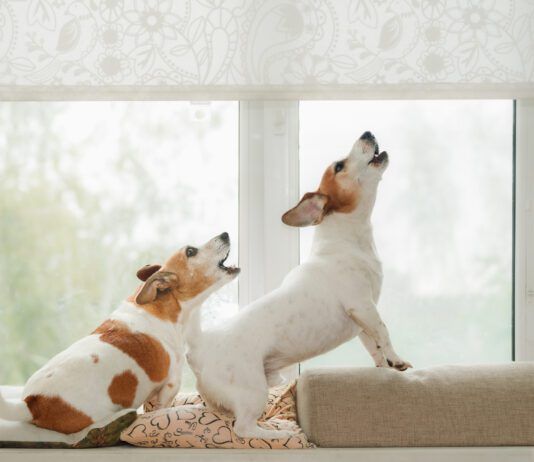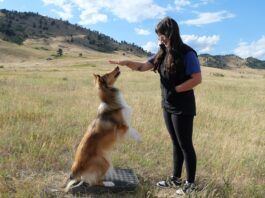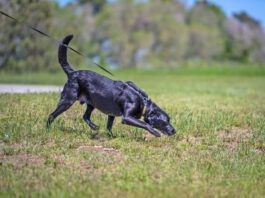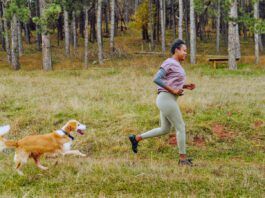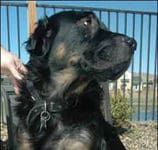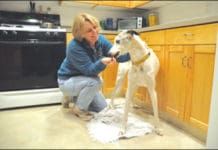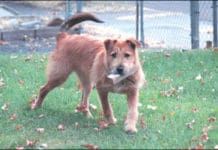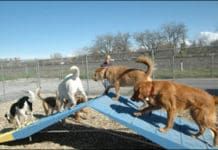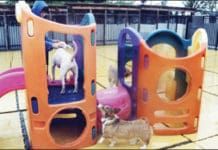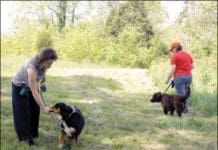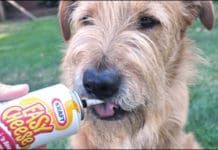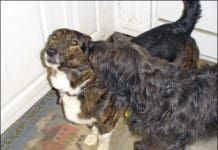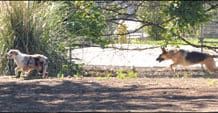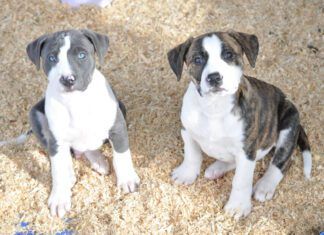Behavior Modification for Itchy Dogs
Excessive self-licking and chewing can be caused by a medical issue. It can also be a behavioral problem, a classic example of an obsessive/compulsive disorder. Either way, it's annoying to the dog's human companion, and dangerous to the health of the dog. Here are tips for dealing with dogs who self-lick and chew excessively. To begin behavior modification, determine your dog's stressors and start eliminating them. Make a list of everything?you can think that is stresses your dog even just a little bit, even if the stressors don't seem directly related to the licking. Your list might include thunder, small children, dogs on television, cats, riding in cars, visits to the vet, shock collars, medical issues, and many more. Most owners can identify between 10 and 20 stressors for their dogs.
Maintaining Healthy Physical Contact with Your Dog
Have you ever stopped to think about how many times a day you do something to your dog that involves physical contact? I’m not talking about petting him when he nudges up against your leg; I’m talking about grasping his collar, putting his leash on, picking him up, wiping debris from the corners of his eyes, wiping the mud off his paws, trimming fur somewhere on his body, and many more “husbandry” procedures that require various degrees of restraint and touch. Chances are you really only think about it when your dog protests, but chances are he thinks about it every time you reach for him.
5 Things to Do the Next Time Your Dog Grabs Your Stuff and Runs
Your dog grabs your stuff and runs away either because she knows you're going to take it from her and she doesn't want you to, or she's inviting you to join in her a fun game of Catch me if you can." In either case
Does Your Dog Bark at the TV?
Our Corgi, Lucy, barks at the television. Not only does she bark at dogs, she may also bark at horses, giraffes, cartoon hippopotami, and any other animal or ersatz animal, as well as menacing human figures. It's at least a little annoying, if not irritating. Given her herding-dog Type-A control-freak personality she may always be somewhat prone to respond to television stimuli, but we've made a lot of progress using several of these tactics.
Bark Back
My husband and I have subscribed to Whole Dog Journal for many years. We were shocked when we read the article about the dog that was shot (“Dog Shootings by Law Enforcement Seem to Be on the Rise,” November 2010). There is so much unthinking cruelty in our civilization toward all animals! The facts about the shooting have haunted me since. I applaud your publication for bringing this shooting and others to your readers’ attention. Keep fighting the good fight!
Help for Dogs With a Healthy Phobia of Stairs
Occasionally I’ll get a call from a client who is having trouble getting their dog to go up or down stairs – a frustrating dilemma when you want your canine companion to be able to accompany you wherever you go. First, be sure your stairs are covered with a traction-providing surface, so he doesn’t slip and scare himself if he tries to use them. Next, here are some tips for overcoming this challenge.
Doggie Daycare Can Be a Wonderful Experience: But is it For Every Dog?
The term "doggie daycare" has become a panacea in recent years for all manner of canine behavioral ills. Does your dog engage in destructive chewing? Nuisance barking? Rude greetings? Poor canine social skills? Mouthing and biting? Separation anxiety? Just send him to doggie daycare, and all will be well. You hope. I'll admit I'm as guilty as the next trainer of suggesting a daycare solution for a huge percentage of my behavior consult clients. The fact is, many of today's canine companions suffer from a significant lack of exercise, stimulation, and social time with their own kind. A good daycare provider can go a long way toward meeting those needs.
Understanding Aggression in Dogs
Aggression. It's a natural, normal dog behavior, but it's also a scary word that evokes images of maulings and dog-related fatalities. The term aggression" actually encompasses a long continuum of behaviors
It’s Not Your Imagination: Dogs Do Mimic Their Owners
Behavioral scientists have long questioned whether dogs are capable of mimicking each other or people. A recent study published in the Proceedings of the Royal Society B: Biological Sciences has shown that dogs are not only capable of mimicking their owners, they do so automatically. In fact, their drive to copy our head and hand (paw) movements is so strong that they tend to do so even when it is not in their best interests.
Does Your Dog Bite Your Hand While Receiving Treats?
Many of us have dogs who bite down too hard when taking dog treats – this is a canine behavior sometimes known as “hard mouth.” Some dogs take treats forcefully all the time; others get hard mouths only when stressed or excited. One theory is that a hard mouth is a function of bite inhibition – or lack thereof. If a dog doesn’t learn to use his mouth softly during puppyhood, he’s likely to resort to using too much pressure with his mouth throughout his life. But some dogs with acceptably soft mouths take treats hard when stressed or excited. Here are five things you can do when facing a “hard mouth” challenge.
Obsessive Compulsive Behavior in Dogs
Owners of herding and sporting breeds Border Collies, Aussies, Kelpies, Labradors, Goldens, and others often cheerfully talk about their dogs' obsession" with tennis balls. What they really mean is that their dogs are very reinforced by the opportunity to chase a ball. That kind of intense interest in a ball or toy can be useful for training and management purposes
Understanding Highly Predatory Dogs
I remember a day when I was waiting in the vet's office for my dog's appointment. The man sitting next to us started telling me, with beaming pride, about how his little white Westie had caught seven barn rats in the past week. I couldn't help but admire this cute, fluffy dog's superior hunting skills. Predatory behavior in dogs is something I respect. From following a scent trail, to stalking a bird, chasing a ball, or herding sheep, I am intrigued with the many forms predatory behavior manifests in our dogs; it is part of what makes dogs so amazing! But, predatory behavior is not so admirable (and much less socially acceptable), when, instead of it being a country terrier ridding a barn of rats or an Aussie herding sheep, it is your city dog chasing a skateboarder or the neighbor's cat.


